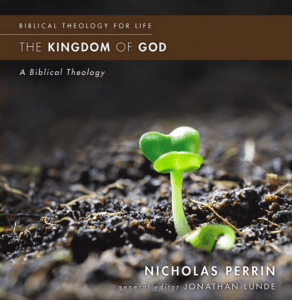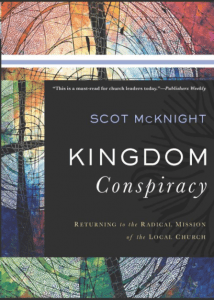This post, on Cessationism, Word-Faith and ‘Another Gospel,’ is by T, a regular contributor here. (I’m ready to call him a Jesus Creed Correspondent.) [Cessationism, roughly, means the miraculous gifts seen in the New Testament have ceased and are not therefore today.]
I want to start this discussion with our ideas of ‘gospel.’ As we’ve discussed here many times in recent months, Scot’s most recent book, King Jesus Gospel, has the ironically surprising thesis, with which I agree, that if we want our term “gospel” to match the apostles’ understanding of the term, then we need to start thinking of the gospels (Matthew, Mark, Luke & John) as ‘the gospel.’ These ‘officially authorized’ stories of Jesus’ arrival, public life and work, death and resurrection (as the culmination of Israel’s story), are the gospel of Jesus. It is the actual story of Jesus—his manner of arrival, his recorded actions and words, culminating in his particular death and resurrection—as the fulfillment of God’s promises and work via Israel for the whole world, that the apostles proclaim as the gospel. Further, in proclaiming himself as this centerpiece of God’s promises and work, and inviting others to follow him, Jesus was not only proclaiming the gospel, he was the walking embodiment of it, and he knew it. To trust him and to trust “the gospel” were the same thing, because the gospel focused on him as the Christ of God’s kingdom-en-route.
It was in the context of having read Scot’s book and letting these ideas ruminate, tearing down structures in my mind and building new ones, that I read a post by Roger Olson asking if the word-faith movement within extreme Pentecostalism presented ‘another gospel.’ Let me add right now that I disagree with word-faith (and ‘prosperity gospel’) teaching wholeheartedly. In the interests of space, my naked disavowal will have to suffice. But as I read the post that was rightfully denouncing extreme word-faith and prosperity gospel teachings, I couldn’t help but wonder, If the gospels are the gospel, does extreme cessationism present a “gospel” that is farther from “the gospels” than word-faith Pentecostalism?
As I thought about this, I thought of several things. Initially (as a born and raised Biblicist evangelical!) I thought in terms of express scriptural support for word-faith on one extreme and for extreme cessationism on the other. On that score, word-faith has a clear advantage over cessationism. Even if it has to be selective in its NT areas of focus, it can at least point to clear, express NT teachings, not only to support the general idea that God does miracles through his people, but also the extreme word-faith teachings (Mark 9:23, James 5:15, Matthew 17:19-21). Again, while I think other portions of the NT make it clear that these verses must be nuanced to avoid taking them without any qualification, they are more expressly supportive of word-faith teachings than most of us would like. But my next line of thought wasn’t rooted in my Biblicist leanings and prima-scriptura goals, but in Scot’s thesis. Namely, if the gospels are the gospels, they proclaim a Jesus that not only heals as the bread and butter of his work, but also
– Authorizes/commands others who represent him to heal the sick, cast out demons, raise the dead,
– Commends the faith of those who believe in his authority and/or willingness to heal (Centurian, Canaanite woman),
– Challenges and/or criticizes the faith of his disciples when they don’t have the faith to believe that THEY can cast out demons in his name,
– Predicts that anyone who believes will also do what he has been doing (John 14:12; Mark 16:17),
– Sends out apostles after his resurrection who found churches who then, in fact, also do miracles and signs and wonders in Christ’s name (Galatians 3:5, I Cor. 12-14, James 5:13-18).
Considering all this and more with “the gospels are the gospel” ringing in my head, I began to lose articulable reasons to answer this question in the negative: “Do word-faith Pentecostals proclaim a Jesus, a gospel, more like the Jesus presented in the gospels than cessationists do?”
The best argument I could come up with was the “prosperity” teaching that so often accompanies Pentecostalism of various stripes. Scot’s thesis gives us nothing positive to say about prosperity gospel preaching, whether Pentecostal or otherwise, considering the relative poverty of Jesus, the apostles, and many early churches. But as we consider the larger questions, let me clear something up. I’m not going on any heresy or witch hunts. My basic posture is that I’m convinced that God is much more familiar and comfortable with our inevitable errors about him than we are, at least I hope so for my sake. I’m not looking to label anybody or get excuses for dissociation instead of discussion.
I’m just asking the question that struck me in light of Scot’s thesis, namely, whose “Jesus” is farther away from the Jesus of the gospels: word-faith Pentecostals or cessationists, at least on the dramatic point on which these groups differ? I might then ask a second follow up question: For each of us who want to be always reforming and letting “the gospel” be the central focus of our ongoing reform and growth, is this an area in which we are culturally and communally conditioned to be blind and/or resistant to the gospel? For my part, despite having participated in some wonderful and surprising prophetic and healing miracles and even taught repeatedly on the subject, I find my lack of faith quite stubborn, and can understand how even the apostles can have “little faith” to do these works themselves even after years of personal exposure and apprenticeship to Jesus in the flesh.











